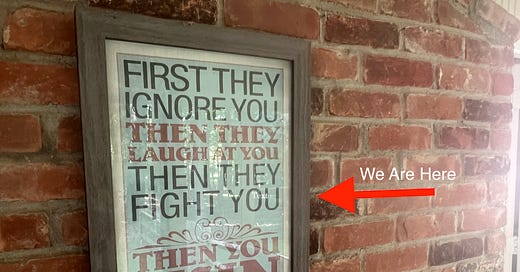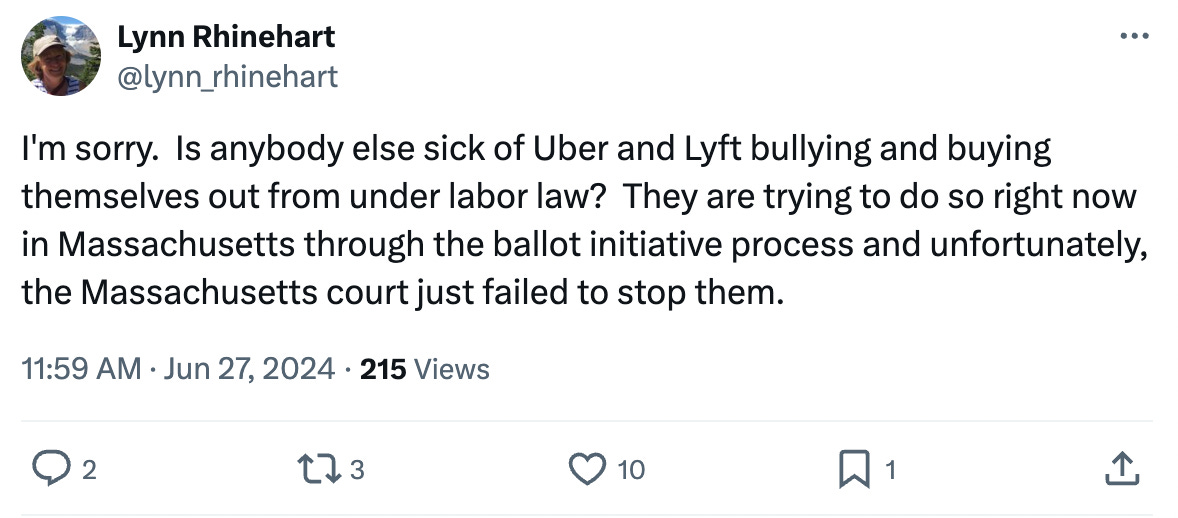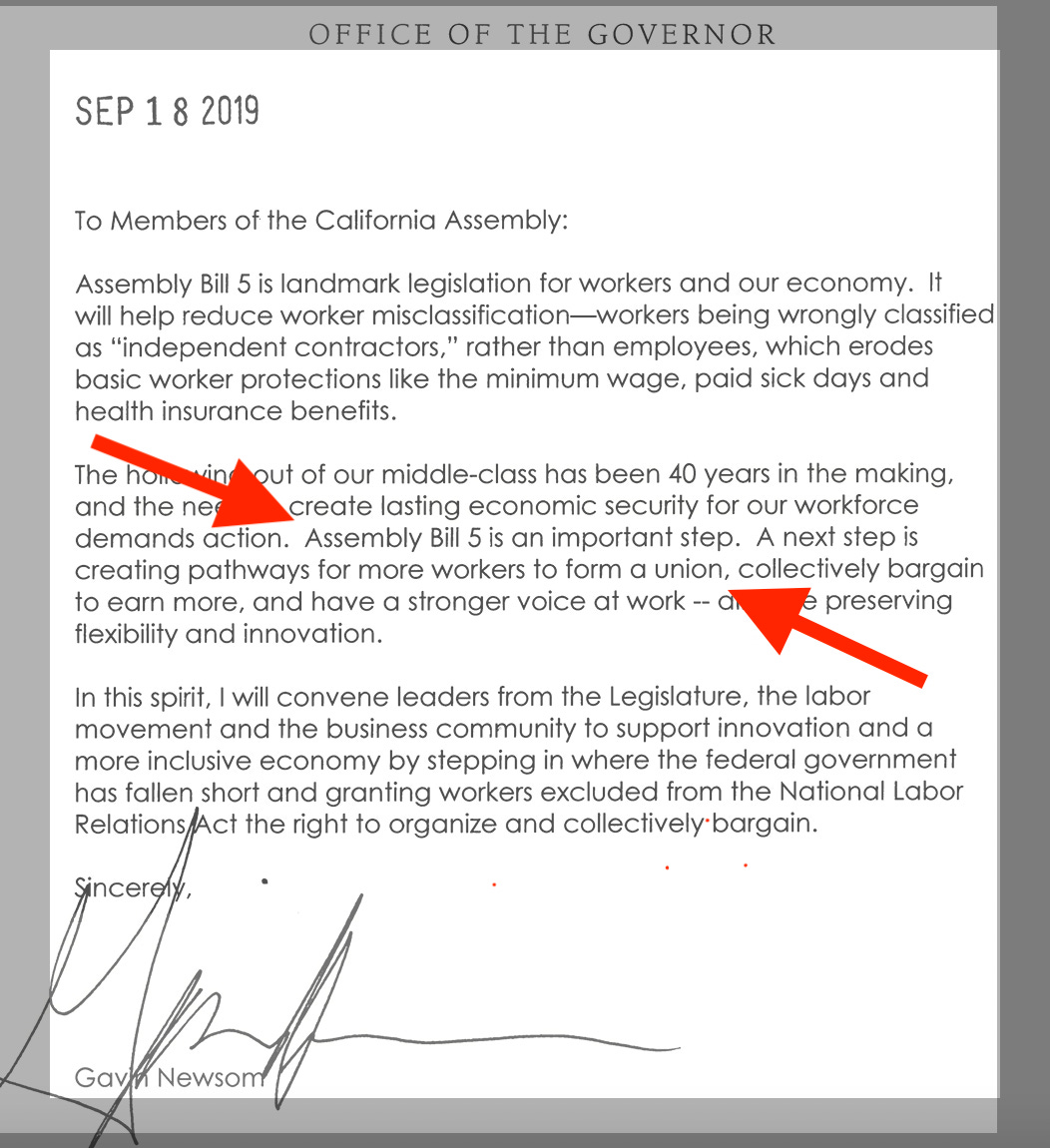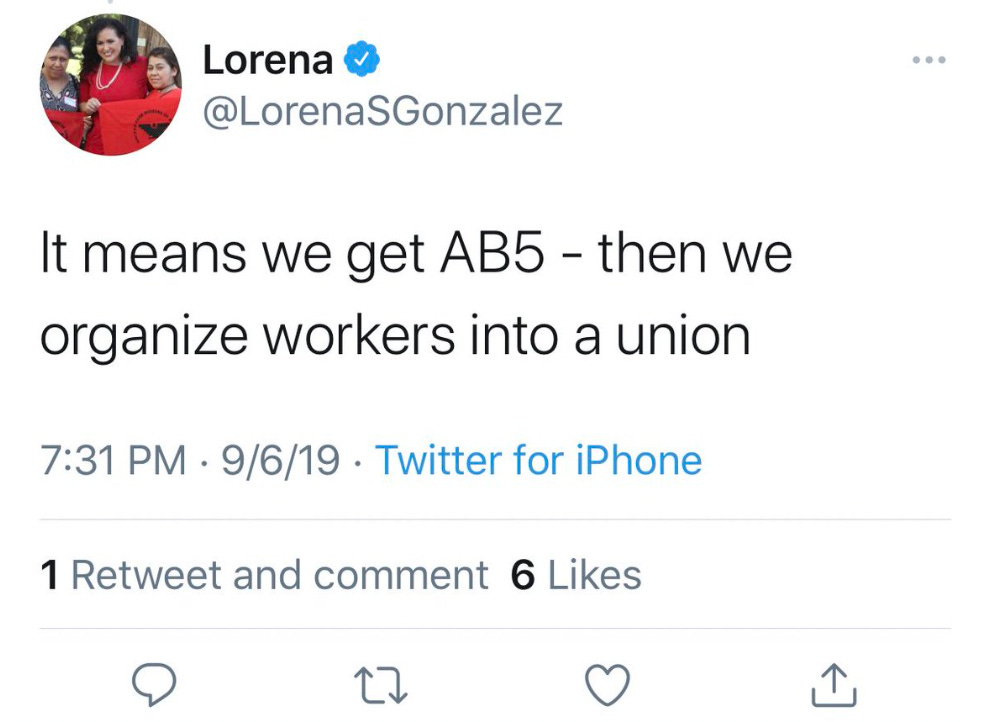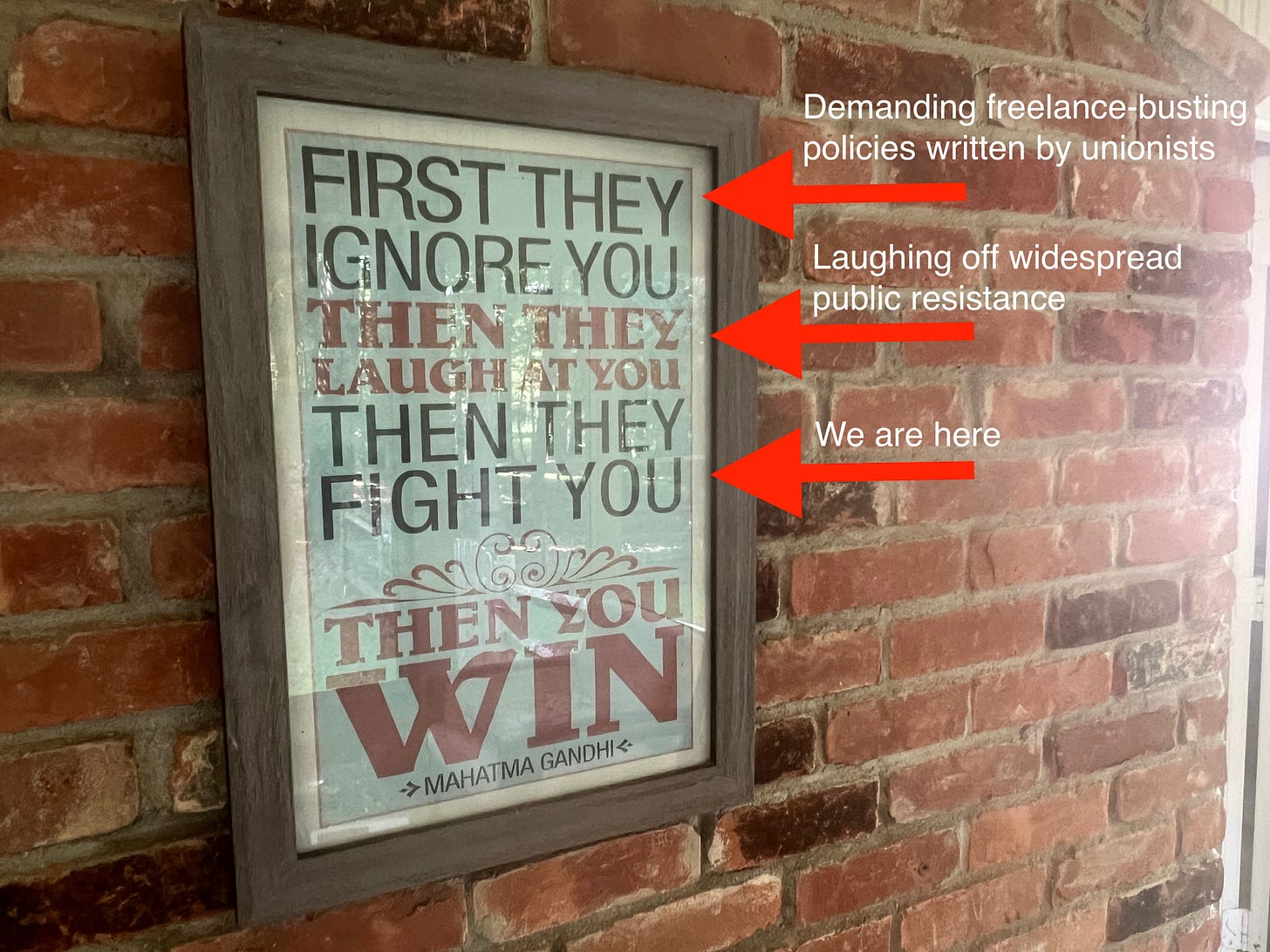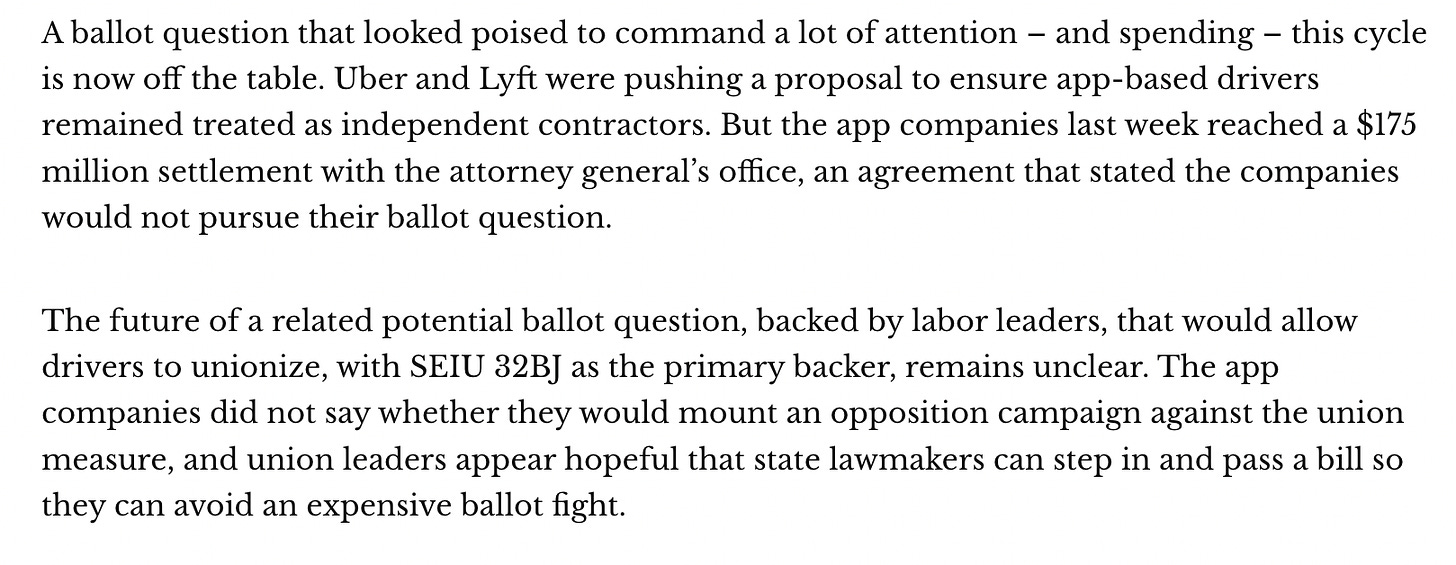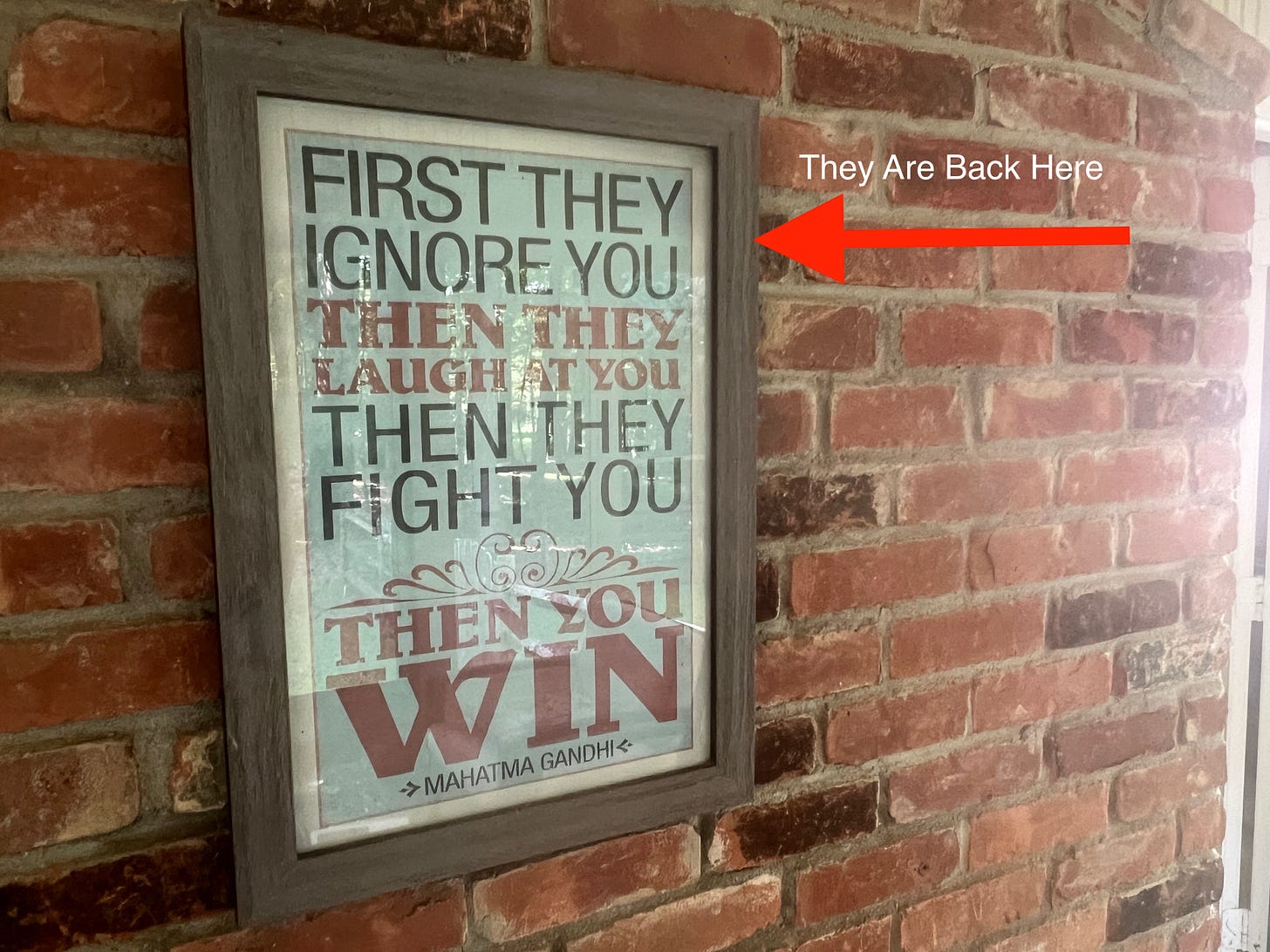The Big Fear? A Real Rematch
Massachusetts was headed for a California-style vote on independent-contractor status. The freelance busters feared they'd lose. Then, this happened instead.
Lynn Rhinehart’s tweet signaled something much bigger than it actually said.
Ms. Rhinehart is the former general counsel for the AFL-CIO, and is now a senior fellow at the union-backed think tank Economic Policy Institute. Suffice it to say that she sees the world through really thick, union-colored glasses.
Late last week, she tweeted this:
Her tweet was about way more than it appeared. It was a massive tell.
The freelance-busting crowd feared that they were going to lose.
Again.
And bigly.
To understand why, you have to know that Ms. Rhinehart was focused on a particular scene from a much bigger drama that unfolded late last week in Massachusetts. Her tweet revealed only a fragment of the full story that played out in ways that could have ramifications for independent contractors all across the country.
As I watched the news unfold while working out on my porch, I glanced up at the sign that hangs on my wall—and realized why people like Ms. Rhinehart were so upset:
They know that our side, not theirs, is closer than ever to winning the freelance-busting war that they launched against us.
The Ballot Measures
The full story that happened on Thursday began when the highest court in Massachusetts approved not one, but two ballot questions.
The court’s ruling cleared a path for voters to decide this fall whether app-based drivers for companies like Uber and Lyft should be independent contractors or employees, and if they should be able to organize and collectively bargain.
One ballot measure—the one that left Ms. Rhinehart despondent—is backed by Uber and Lyft. It supports what most drivers say they want: to remain self-employed.
The other ballot measure is backed by the unions that Ms. Rhinehart champions. It would allow the unions to try and organize those rideshare drivers.
What the Massachusetts court did in approving both ballot measures was pave the way for democracy to do its thing and let the voters decide. As Bloomberg Law explained it:
“The ruling is a victory for the Massachusetts Coalition for Independent Work, an industry-backed alliance behind the measure which is seeking to preserve drivers’ independence amid ongoing legal and policy debates about how app-based workers should be classified. The other opinion is a win for the 32BJ affiliate of the Service Employees International Union, which is supporting the unionization proposal that would allow drivers to negotiate pay, benefits, and working conditions.”
Numerous media organizations reported that the court’s ruling did indeed follow massive spending and efforts—but not just by tech companies, as Ms. Rhinehart would have her followers believe. The unions have been spending plenty of time and money on the independent-contractor issue in Massachusetts, too.
Here’s how MassLive put it:
“Both sides have engaged in well-organized and expensive advertising campaigns to sway public opinion in this November’s general election.”
Freelance busters like Ms. Rhinehart, lamenting on Twitter/X that they are victims of Big Tech, were in fact being frustrated by the court imposing a measure of fairness in the Massachusetts ballot-measure fight.
Her choice of words revealed that she knows the truth just as well as we do.
If everyday people get to decide whether the government should protect our right to choose self-employment, then the freelance busters on her side lose.
Every single time.
Origin Story
The Massachusetts ballot fight is a rematch of what happened in California in 2020, when that state was the primary battleground for the national wave of freelance-busting attacks that unionists have been waging against us all.
In California, there was just one ballot measure. It was called Proposition 22. It was the tech companies’ response to a law called Assembly Bill 5 that restricted all kinds of people’s longstanding right to earn income as independent contractors.
AB5’s sponsor was Teamster-turned-assemblywoman Lorena Gonzalez, who joined Rhinehart in what appears to have been a tag-team game of peddling false data to push the freelance-busting agenda. Their real goal with AB5—as with all kinds of freelance busting—was to get around existing laws that protect independent contractors from union organizers.
California Governor Gavin Newsom, in his AB5 signing statement, stated explicitly that the law was intended to help unions organize independent contractors:
AB5’s sponsor was also clear about the law’s intent. She tweeted:
This freelance-busting fantasy was sharply at odds with what most independent contractors—including most rideshare and delivery drivers—wanted at the time, and continue to want today, which is to remain self-employed.
Thus, the public vote on Proposition 22 was a chance to right at least some of the wrongs that union-backed lawmakers had imposed by enacting Assembly Bill 5 into law. Prop 22 was limited to just the handful of independent contractors who are rideshare and delivery drivers, but it served as a public referendum on the legislative attack that California officials had waged against the right to choose self-employment.
On Election Day in 2020, the will of the people could not have been clearer.
Californians stood against the union-backed lawmakers, and with the rideshare and delivery drivers.
Voters across party lines, weighing in by a nearly 60-40 margin, kept the drivers’ independent-contractor status intact.
Biding Their Time
Ever since that vote in 2020, the freelance-busting crowd has been trying whatever else they can think of to advance their deeply misguided agenda across the country. They’ve called for legislation in other states. They’ve demanded a law in Congress. They’re backing new rules being imposed by regulatory agencies. They want ballot measures of their own.
They have been challenged at every turn by public outcry, lawsuits (including this one where I’m a plaintiff) and reasonable lawmakers who are Republicans, Independents and moderate Democrats alike.
Freelance busters including Ms. Rhinehart refuse to accept this reality. Instead, they portray themselves as she did in her tweet: as victims of the tech giants Uber and Lyft.
The Teamsters did the same thing, and threw in a condemnation of Massachusetts’ top court for daring to give anybody other than unionists a say in the matter:
Knowing all of that background, you can easily understand why the sign that hangs on my porch explains the situation perfectly.
The freelance busters are not actually afraid of the tech companies they continue to vilify as their main bogeyman.
What they’re really afraid of is the will of the people.
We all know the same truth. Given the chance, most Americans will vote to protect our right to choose self-employment.
Alas, This Rematch is Unlikely
Despite the dramatic setup for a ballot-proposition rematch in Massachusetts this fall, it appears that Prop 22: Part Deux may have to wait.
Just a few hours after the court’s ruling dropped late last week, allowing both ballot measures to proceed, the Massachusetts attorney general made an announcement of her own.
She agreed to a deal that will let Uber and Lyft drivers in Massachusetts remain independent contractors, with a minimum hourly wage of $32.50 and some benefits.
Interestingly, the attorney general’s announcement noted that the deal averts giving the people of Massachusetts a chance to vote on the matter:
“The settlement resolves the Office’s multi-year litigation against Uber and Lyft and puts a stop to the threat of the companies’ attempting to rewrite state employment law via a 2024 ballot initiative which would have resulted in drivers receiving inadequate protections and an earnings standard that would not guarantee minimum wage.”
Also notable from that officially sanctioned state announcement is that it includes a quote from Massachusetts AFL-CIO President Chrissy Lynch. She claimed victory, which at first seemed odd, given that just a couple months ago, she told The Boston Globe how she felt about anything less than Uber and Lyft drivers becoming fully unionizable employees:
“I see this as an existential threat not just to the labor movement but to society.”
You read that correctly. She said the drivers being allowed to remain independent contractors would be an existential threat to society.
And yet, here she was in the attorney general’s press release, after the drivers did, in fact, remain independent contractors:
“We deeply appreciate AG Campbell’s hard work holding these corporations rightfully accountable to Massachusetts employment laws.”
Why would the head of the Massachusetts AFL-CIO flip-flop like that?
One hint is that union-backed Democrats currently have trifecta control of the Massachusetts government. They command both houses of the state’s legislature as well as the governor’s office.
As the Commonwealth Beacon reported, even after all of the chess moves last week, the freelance busters still believe they can win the Massachusetts game:
Read the end of that last sentence again.
Union leaders appear hopeful that state lawmakers can step in and pass a bill.
That means this:
Notably, some attorneys say the tech companies may already be making moves to outsmart the freelance busters at this version of the game, only on a wider scale.
In evaluating the deal that Uber and Lyft cut with the Massachusetts attorney general, attorneys from Fisher Phillips wrote:
“Outside of Massachusetts, this settlement—which allows for both the maintenance of an independent contractor model and important protections for drivers—may serve as a model for other companies operating in the gig economy and could influence similar cases in other states. And if implemented preemptively, it could help stave off widespread reclassification efforts and litigation.”
That means the tech companies have a regulatory model they can try to get legislatures to enact—a model that would protect the right to choose self-employment.
All across the country.
It’s All the Same Fight
No matter what happens next in Massachusetts, voters would be wise to heed the words of the spokesman for the Massachusetts Fiscal Alliance Foundation.
Before the attorney general’s announcement of a deal last week, this spokesman explained the goal of the freelance-busting ballot measure to MassLive:
“We have no doubt that most Massachusetts voters will not be aware of the radical and far-reaching consequences this question will have on labor law, if passed. [The ballot question] goes well beyond its stated goal of simply allowing Transportation Network Drivers — rideshare and delivery drivers — to unionize. It will create a completely new labor category, and in violation of federal labor law.”
That’s the big-picture point. The freelance busters are trying to get around existing law so they can unionize independent contractors.
Just like they did in California.
Just like they are doing all across the country.
It’s irrelevant whether the freelance-busting strategy is a ballot measure or a piece of legislation or a new regulation or whatever else they come up with next to try and destroy our income and careers. Their goal remains the same.
They want to restrict or eliminate our right to choose self-employment.
Our job is to keep showing them that we will not be ignored. We will not be laughed at. We will, in fact, continue to fight.
And then, no matter what they try next, we will win.

